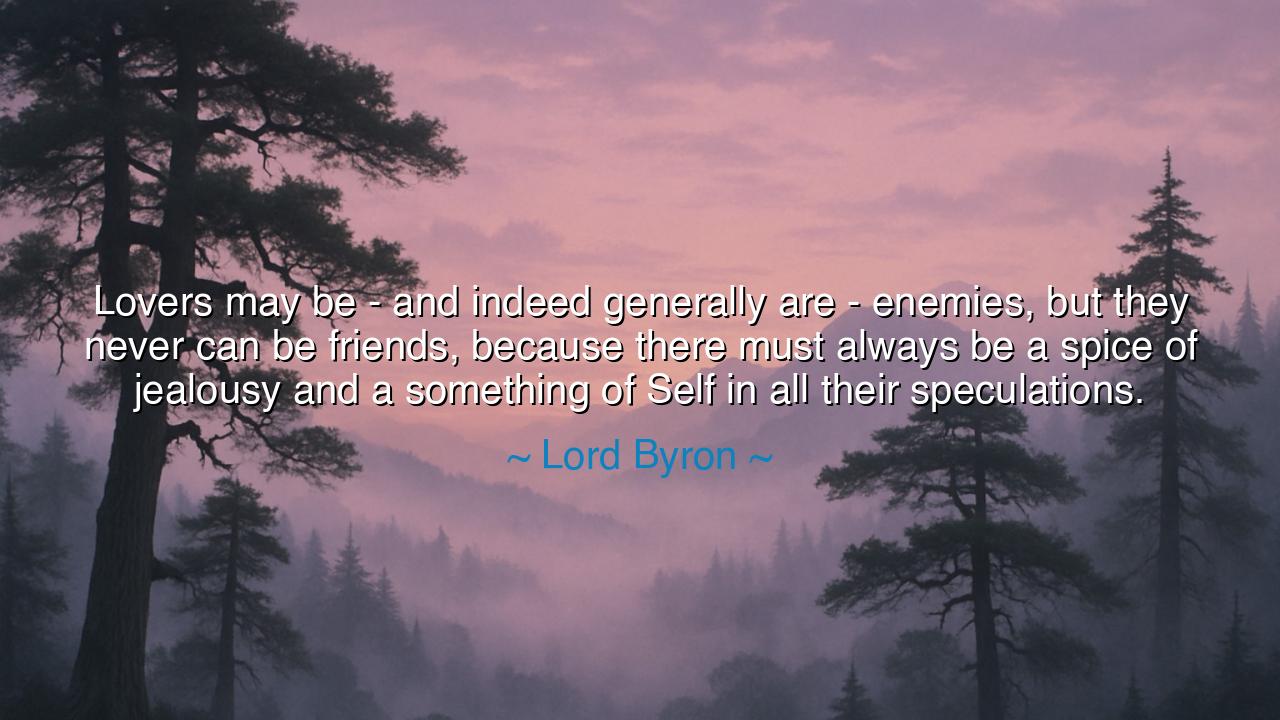
Lovers may be - and indeed generally are - enemies, but they
Lovers may be - and indeed generally are - enemies, but they never can be friends, because there must always be a spice of jealousy and a something of Self in all their speculations.






In the depths of human passion, where the heart burns brightest, Lord Byron—that storm-tossed soul of the Romantic age—uttered a truth both bitter and sublime: “Lovers may be—and indeed generally are—enemies, but they never can be friends, because there must always be a spice of jealousy and a something of Self in all their speculations.” These words come not from idle observation but from the ashes of Byron’s own heart, shaped by his tempestuous affairs and restless pursuit of love. To understand them is to peer into the eternal paradox of human affection: that love and rivalry, tenderness and jealousy, are threads of the same tapestry, woven inseparably by the hand of desire.
Byron speaks of the impossibility of friendship in love, not because affection is false, but because love, by its very nature, consumes. Friendship is gentle, built on equality, patience, and calm admiration. But love is fierce, demanding, and alive with the fever of possession. Where friendship says, “I wish you happiness,” love whispers, “I wish to be your happiness.” Thus, where friendship is selfless, love is tinged with Self—that unquiet craving to be the center of another’s world. It is this yearning, this hunger for exclusivity, that makes love both divine and dangerous.
Even in its most sacred form, jealousy shadows love like a silent twin. It is not always born of mistrust, but of intensity—the fear of losing what gives life its fire. Byron calls it a “spice,” for in small measure it gives love its flavor, but when poured too freely, it poisons the soul. Lovers who begin as allies often find themselves as adversaries, battling not each other, but their own insecurities and pride. They become enemies, not in hatred, but in struggle—for love demands so much of the heart that it sometimes leaves no space for peace.
Look to history and you will see Byron’s truth reflected. Think of Antony and Cleopatra, whose passion shook empires but destroyed them both. They loved fiercely, but each sought to rule as much as to adore. Their affection was a dance of power, their devotion steeped in ego and desire. In the end, it was their inability to be “friends” that led to their downfall. For friendship can survive pride, but love, once wounded, bleeds endlessly. Such is the tragedy of passion—that it gives life its color, yet can just as swiftly drain it away.
Yet, Byron’s words do not condemn love; they reveal its nature. He speaks not as a cynic but as one who has tasted its extremes. To love deeply is to confront the self—to see one’s own pride, fear, and need reflected in another’s eyes. The “something of Self” he describes is the eternal human struggle: we seek connection, yet we guard our individuality; we long to be known, yet we fear surrender. Thus, love becomes both mirror and battlefield, sacred and perilous all at once.
The wise understand that love and friendship are two different sanctuaries of the heart. Friendship is built upon understanding; love upon emotion. One endures in silence; the other burns in storms. To try to turn love into friendship is to cool the flame that gives it life. Yet, to let the flame rage uncontrolled is to risk destruction. The art, then, lies in tempering love with respect and humility—allowing space for both passion and peace, devotion and distance.
So let the lovers of the world heed Byron’s counsel. Do not expect love to be calm, nor friendship to be fiery. Recognize the jealousy that stirs within you, not as sin, but as a call to self-mastery. Learn to love without possession, to care without control, and to cherish without fear. For only when you understand the storm within your own soul can you sail the sea of another’s.
And the lesson endures: true love is not friendship—it is transformation. It burns, refines, and reveals what we are made of. To love is to risk the self; to endure that risk is to touch eternity. Byron’s truth, though sorrowful, is sacred—for it reminds us that love, in its purest form, is not meant to make us comfortable, but to make us alive.






AAdministratorAdministrator
Welcome, honored guests. Please leave a comment, we will respond soon